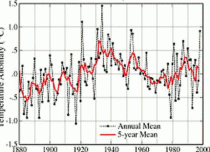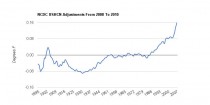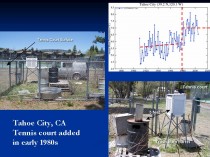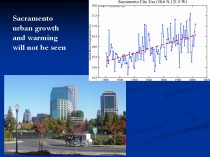Ultra-alarmist Greg Craven: “in my short time at AGU, I discovered four scientists who are already creating some form of survival retreat for their family, and they told me there are many more”
AGU Fall Meeting. Part III: An Open Letter From Greg Craven | Climate Etc.
It might surprise, and hopefully disturb you, to hear that in my short time at AGU, I discovered four scientists who are already creating some form of survival retreat for their family, and they told me there are many more. But they are all too scared of being ostracized in the scientific community if they speak of it. It struck me that they aren’t even “in the closet” yet. They still think they are isolated freaks of nature, ashamed to share what they truly feel.
...I am filled with despair. As a result of my time at AGU, I’ve decided to retire completely from continuing to pursue making a difference in the debate, and for my family’s sake I will focus instead on building our own lifeboat. And leave the debate to others.
I know that may confirm to many people that I have indeed gone off the deep end. And I grieve if the many people who have respected and helped me in spreading the videos and writing the book now feel betrayed. So be it. But, given the fact that those four scientists I mentioned were paleoclimatologists, with access to the newest and best data, and with their position of knowing more than any other discipline what the global climate is capable of doing, perhaps you shouldn’t assume I’m crazy. Or that my message has no merit.
---------
Craven Attention
By Steve Mosher, Guest Post on Watts Up With That
Steve Mosher reports that things got a bit bizarre at the 2010 American Geophysical Union convention in San Francisco.
At AGU today I was witness to a “new AGU.” In the very first Steven Schneider Memorial speech Michael Oppenheimer explained the variety of ways that climate scientists can engage the public and the press. There was much I can recommend in Oppenheimer’s advice. He advised scientists to understand that their expertise on particular scientific issues does not give them expertise on all issues, especially on issues that touch on policy. It is one thing to note a scientific finding that climate models predict a 3C warming for the doubling of CO2; it is quite another thing to opine that controlling CO2 is the answer.
Oppenheimer also was clear that scientists should state their bias openly. He self identified as a “progressive” and was open about his time spent at the EDF. All in all a good presentation, especially for fans of C.P. Snow. Oppenheimer did, however, say one thing that was bizarre.
He seemed to offer the following advice:
You can’t sit on the sidelines and do nothing, because your name might show up in a climategate mail. He argued that some poor scientist had been vilified because his name was merely mentioned in a climategate mail. I have no clue who he is talking about, but his argument came down to this. If you think you are safe as a scientist by merely staying in the lab and speaking only about science, you are wrong. Why? because some guy got vilified by just being mentioned in the mails. Let’s be clear about who was the center of the mails: Jones and Mann. As Oppenheimer stated a scientist should not think his expertise in science gives him expertise in other areas, areas like the climategate mails and areas like advising other scientists how to conduct themselves with the press and public. Personally, I’d just block mails from people who ask me to delete things.
After Oppenheimer’s speech the “new AGU” assembled a panel of authors to discuss how to communicate with the press and the public. It was a great panel. A sullen Heidi Cullen didn’t say a word. A late arriving Jim Hansen and Naomi Oreskes who suggested that scientists should study history. One member of the panel dominated the discussion, Greg Craven. If you don’t recognize the name, you might recognize the jester hat: Yes, Greg is the high school teacher who made that video about global warming. Basically Pascal’s wager.
Greg nearly always starts every long-winded rant with the phrase “I’m no expert.”
Today was no different, but it came with a twist. He did claim to be an expert in communicating to the public. He was not. I cannot begin to describe the delicious sense of irony I felt when I listened to a panel of people who have no demonstrated skill or expertise in selling messages to the public, trying to tell scientists how they should sell a message to the public. And the questioners were also entertaining. Only one, Steve Easterbrook, managed to ask a rational question. But let’s roll tape to the questions and Craven’s performance.
One of the first questions referenced Revkin’s column on the need for more Republican scientists. Oreskes, with boring predictability, said the Republican party has been anti-science since god was a kid. Epic fail, since the question was not a history question, nevertheless, she trotted out her usual gruel. Craven then launched into his act. He wasn’t an expert on psychology but he read that conservatives are irrational and prone to confirmation bias.
There are so few Republican scientists, he explained, because Republicans are irrational.
That is a quote. That is the “new AGU”.
I’ve explained before that this view of one’s opponents leads to only one end. If you believe your opponents are irrational, then at some point you contemplate using force to get them to agree. I’m not shocked to find this in a teacher. The urge to commit violence on those who refuse to learn is an occupational hazard. I taught, I know. And we should not forget who hit the red button first:
There is a lesson here. People who talk to a captive audience of students do not have expertise in talking to the public at large. You do not convince Republicans by calling them irrational. You do not assume that an audience at AGU is full of Liberals. Greg went on for some time, foaming at the mouth about getting passionate (the first step to violent action) and I don’t think anyone on the panel thought that there might be a conservative ( much less a Libertarian who believes in global warming) in the audience . One panelist copped to being an independent. Finally, no one on the panel seemed to realize that you do not convince the unconvinced by calling them denialists.
They did seem to agree that Al Gore was not a good choice as a spokesperson and that the meme of “the science is settled” was a bad idea.
The next questioner, sensing that Craven had stolen the show, decided to ask a 10 minute “question,” This activist from Oakland spoke with fire and passion about scientists needing to speak out. Craven, interrupted her passion because she had gone on “long enough”, and tried to steal the show back. Then she complained about him cutting her off.
Thunderdome.
Cullen looked pained. The only professional was silent. At some point Craven made a promise to shut up and stop hogging the limelight. A promise he would break on nearly every subsequent question, even those questions directed specifically away from him. At one point he banged his head on the table. Rational thought at it’s best. And he scribbled furiously as other people spoke, like he was getting ready to pass a note in class.
John Mashey asked a question as forgettable as his screed on Wegman. Craven took charge again and argued the “if not now, when” argument.
Basically, it goes like this. As a scientist you have to decide at some point that enough is enough. You have to put your scientific commitment to the discipline of doubt aside and “blow past” your boundaries. Say what you feel, not what you can prove.
[Steve Mosher: Mr. Craven has complained that this is not a direct quote of what he said. It is not a direct quote, it is, as the text indicates, a synopsis of my interpretation of his argument. ]
Rational thought at its best.
Steve Easterbrook, thankfully, asked the only intelligent question. On one hand we have Oppenheimer telling us take care when going beyond our expertise. On the other hand we have Craven, saying “blow past” your boundaries. Oppenheimer tried to paper over the difference, and Oreskes, who seemed to be shooting me looks as I sat there laughing, agreed that there was a difference between these views. Craven, breaking his promise again, read what he had been scribbling. Some sort of challenge to climate scientists that he promises to post.
By this time Hansen had joined the dais and the next questioner wanted to know if the push for action against climate change should be like the civil rights movement. Again, the scribbling genius of public communication took the microphone. And explained that he was finally going to keep his promise about shutting up. So, he handed his statement to Hansen, who dutifully read Craven’s forgettable text. Ah the humility of that. Not content with dominating the dais for an hour our expert in communicating with the public hands a note to Hansen to have Hansen read it. “Here Jim, read this for me.”
After all the PR disasters of climategate they still don’t get it. You don’t convince people by calling them irrational or ignorant. You don’t win hearts and minds by calling them denialists. You can’t scare people of faith, whether they have faith in religion or faith in human ingenuity. And you don’t pass notes in class, Greg. Maybe a dunce hat is in order for that move.
Icecap Note: Leon Festinger wrote a book When Phrophecies Fail and coined the term cognitive dissonance for the denial behavior of cultists (religious or now climate) when their prohecies fail (and skeptics are called deniers!). Back in the 1960s, with nuclear war a threat, many built fallout shelters - see that described here. Hey, that is an idea for a ‘green’ business. Though we are seeing the alarmists in the beginning of a self destruction, it may be a slow process as we speculated in 2008 here.
By Steve Goddard

Enlarged and animating here.
In 2000, USHCN apparently wasn’t happy with the fact that the 1930s was the warmest decade - so they gave the past a demotion and bumped the 1990s way up.
Apparently that wasn’t enough though. An astute reader (Steve Case) captured the USHCN data in 2008 and again today. Below is a plot of the further adjustments during the last two years. Once again, the present has been artificially made warmer and the past has been made cooler. Temperatures in 2007 were raised by 0.16 degrees, and temperatures were lowered by 0.08 degrees in 1930.

Enlarged here.
Suppose a company wasn’t happy with their financial reports, so they subtracted money from past earnings and added them to present earnings. What would happen to the people in charge?
Icecap Note: This was the change from USHCNv1 to USHCNv2 in 2009. The v2 removed the Karl 1988 UHI adjustment, replacing it with a ‘change point algorithm’ which is designed to find sudden changes - ‘previously undocumented discontinuities’ (instrument changes, station siting change, etc).

Enlarged here.
As NCDC’s Menne admitted to Anthony it does not find or adjust for the slow ramp up with urbanization like the UHI adjustment in v1 or slow siting degradation as surface stations project found.

Enlarged here.

Enlarged here.
The net trend increase of about 0.25F is not trivial.
The US station set has been among the most stable worldwide. In other places dropout and missing months complicate the urban/ siting/ instrument issues.
It is a mess. Not of appropriate quality to base trillion dollar painful decisions on.
By Joanne Nova
In the print edition the headline is “Newspapers should lead the country"*
David McKnight’s criticism of The Australian (Sceptical writers skipped inconvenient truths) makes a good case study of the intellectual collapse of Australian universities.
Here’s a UNSW “Senior Research Fellow” in journalism who contradicts himself, fails by his own reasoning, does little research, breaks at least three laws of logic, and rests his entire argument on an assumption that he provides no evidence for. Most disturbingly - like a crack through the façade of Western intellectual vigour - he actually asserts that the role of a national newspaper is to “give leadership”. Bask for a moment in the inanity of this declaration that newspapers “are our leaders”. Last time I looked at our ballot papers, none of the people running to lead our nation had a name like “Sir Sydney Morning Herald”. Didn’t he notice that we live in a country that chooses its leaders through elections?
The role of a national newspaper is to report all the substantiated arguments and filter out the poorly reasoned ones (like his), so the readers can make up their own minds.
“The swelling ranks of sceptical scientists is now the largest whistle-blowing cohort in science ever seen...”
The point of the “free press” is surely for the press to be free to ask the most searching questions on any topic. Yet here is a supposed authority on journalism attacking The Australian for printing views of scientists? And these scientists that McKnight wants to silence are not just the odd rare heretic. The swelling ranks of sceptical scientists is now the largest whistle-blowing cohort in science ever seen. It includes some of the brightest: 2 with Nobel Prizes in Physics, 4 NASA astronauts, 9000 PhD’s in science, and another 20,000 science graduates to cap it off. A recent Senate Minority Report contained 1000 names of eminent scientists who are skeptical, and the term “professor” pops up over 500 times in that list. These are the people that McKnight, an Arts PhD, calls “deniers”.
Just because thousands of scientists support the skeptical view doesn’t prove they’re right, but it proves it is nothing like the “tobacco” sceptics campaign that McKnight compares them to, in a transparent attempt to smear commentators he disagrees with.
Ponder the irony that McKnight-the-journalism-lecturer is demanding The Australian adopt the policy espoused by the dominant paradigm, the Establishment, and censor the views of the independent whistleblowers? He thinks repeating government PR is journalism, the rest of us know it as propaganda.
McKnight has so little evidence to base his assumptions on, that he resorts to name-calling - “denier”. He doesn’t name any scientific paper that any skeptic denies, instead it’s just a pre-emptive bully boy technique designed to stop people even discussing the evidence about the climate.
McKnight’s research starts with the assumption that a UN committee, which was funded to find a crisis, has really found one, and that they are above question. He probably has no idea that there are thousands of ivy league physics, geology and engineering specialists who are sceptical. His investigation appears to amount to comparing articles in Fairfax versus Murdoch papers, as if the key to radiative transfer and cumulative atmospheric feedbacks lies in counting op-ed pieces.
If he had made the most basic enquiry, McKnight might also have found out that the entire case for the man-made threat to the climate rests on just the word of 60 scientists who reviewed Chapter Nine of the Fourth Assessment Report. He’d also know that the people he calls deniers, far from being recipients of thousands of regular Exxon cheques, are mostly self-funded, many are retirees, and that Exxon’s paltry $23 million for 1990 - 2007 was outdone by more than 3000 to 1 by the US government alone which paid $79 billion to the Climate Industry during 1989 - 2009.
Just suppose, hypothetically, that the government employed many scientists on one side of a theory, and none of the other. McKnight’s method of “knowing” who is right involves counting up the institutions and authorities who support the grants...I mean, the theory. If science were exploited this way, McKnight would fall victim every time.
So “sharp” is McKnight’s analysis that he calls the independent unfunded scientists “a global PR campaign originating from coal and oil companies”, all while he is oblivious to the real billion dollar PR campaign that is waged from government departments, a UN agency, financial houses like Deutsche Bank, the renewable energy industry, the nuclear industry, and the multi hundred-million dollar corporations like WWF. Here’s a man who thinks David is Goliath.
The people in power, and many major banks, are telling us to be worried about a particular gas. Isn’t the point of an investigative journalist to err… investigate that? Not so, says McKnight. The job of a newspaper is to decide which scientist is right about atmospheric physics. Is Phil Jones from the East Anglia CRU right, or is Richard Lindzen - prize winning MIT meteorologist right? Add that to the new list of duties for aspiring national editors. Tough job, eh?
McKnight’s main error, “Argument from Authority”, has been known for 2000 years, and his entire synopsis is built around this fallacy. Just suppose, hypothetically, that the government employed many scientists on one side of a theory, and none of the other. McKnight’s method of “knowing” who is right involves counting up the institutions and authorities who support the grants… I mean, the theory. If science were exploited this way, McKnight would fall victim every time - blindly supporting the establishment. That doesn’t prove he’s wrong, but it proves he can’t think and that his methodology can be scammed. If he’s right, it could only be by accident. Why is the taxpayer supporting his work, when a random coin toss would do the same job for a fraction of the expense?
His muddy analysis is confused at every level. He claims The Australian has zig zagged from acceptance to denial, but then later, accuses the Australian’s columnists of repeating “the dominant editorial line”. But which editorial line would be dominant ...the zig type or the zag? Doesn’t it destroy the whole meaning of “dominant” if something changes regularly?
For someone who claims to be an authority on history, McKnight can’t tell the difference between science and religion. In science, evidence is the only thing that counts, not opinion. McKnight-the-follower-of-funded-opinions has the gall to question The Australian’s standards of evidence, but the only evidence he offers is only a collection of opinions.
Given that McKnight paints himself as an authority on journalism, yet fails to investigate his base assumption, research the targets of his scorn, or understand the role the free press: he is his own best example of why argument from authority is a fallacy.
If our journalism lecturers are feeding students with grandiose ideas of their own “leadership” roles, how decrepit is the institution where students are not even taught that the highest aim of a journalist is to ask the most penetrating questions, and leave no stone unturned, so that the people they serve might have the best information?
Such is the modern delusion of the trumped up activist-journo: McKnight wants to be the “leader” - to dictate what the public can “think” and to direct where public spending goes - but he doesn’t want to bother running for office or to expose his claim to open debate. He’s nothing more than a totalitarian in disguise. See post here.


